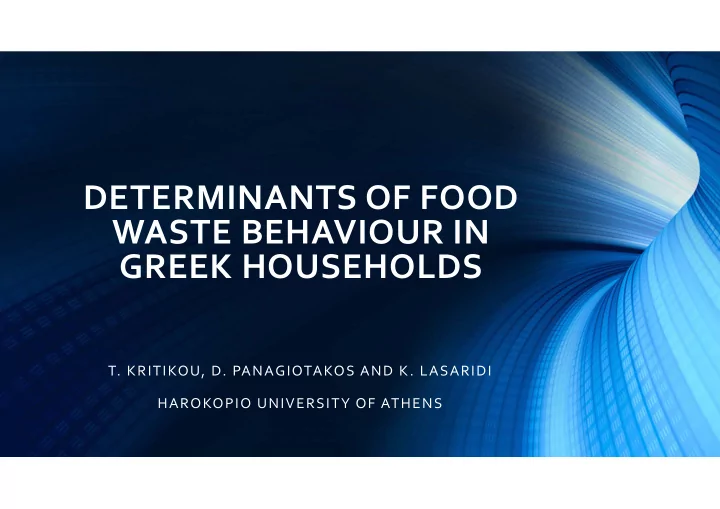

DETERMINANTS OF FOOD WASTE BEHAVIOUR IN GREEK HOUSEHOLDS T. KRITIKOU, D. PANAGIOTAKOS AND K. LASARIDI HAROKOPIO UNIVERSITY OF ATHENS
The global food security crisis, The average annual quantity of food poses a serious threat to peace waste in developed countries is and security in the world almost equal to the total food production in Sub ‐ Saharan Africa
Food waste is a social problem, with a solution lying on social interventions The consumption behaviour of households is as important as the technical or economic aspects in waste management research and decision making Α im of the study: To analyse Greek consumers’ food waste behaviour To investigate the most important determinants that influence the intention to reduce food waste
RESEARCH METHODOLOGY Data collection. Data collection. Convenience sampling Convenience sampling • STATA 12 • Sample survey with a • 921 Greeks between • Exploratory Factor structured the age of 18 and 75 Analysis ‐ EFA questionnaire based completed the • Confirmatory Factor mainly on the Theory questionnaire in the Analysis ‐ CFA of Planned period between April • Structural Equation Behaviour (TPB ) and July 2017 Models ‐ SEM Setting Goal, theoretical Setting Goal, theoretical (response rate 92%) framework and research framework and research Statistical analysis and Statistical analysis and hypothesis hypothesis conclusions conclusions
• Attitudes towards food waste • Perceived behavioural control on capability to deal with household food ‐ related activities TPB The questionnaire • Perceived expectations of other people, who are important, to food includes 67 waste • Intention to reduce food waste TPB questions concerning : • Knowledge of the problem related to food waste • Food ‐ related routines and habits (planning, shopping, cooking) • Moral norms • General environmental awareness and routines Additional • Socio ‐ demographic characteristics variables • Self ‐ reported amounts of Food Waste
SOCIO ‐ DEMOGRAPHIC CHARACTERISTICS OF THE SAMPLE SEX AGE > 64 18 ‐ 24 5 % 55 ‐ 64 11 % 25 ‐ 34 13 % 37 % 11 % MALE 63 % FEMALE 45 ‐ 54 35 ‐ 44 33 % 27 % Primary school Phd 4 % 3 % MSc Gymnasium EDUCATION 11 % 6 % University Lyceum 23 % 30 % Technological Vocational Educational Institutes Training Institute 12% 11 %
MARITAL STATUS PROFESSIONAL STATUS Freelance Domestically 8 % 5 % Retired 7 % 11 % Unmarried 29 % Student Married Full time 8 % 56 % Divorsed / widower Unemployed 60 % 7 % Part time 9 %
SELF ‐ REPORTED AMOUNTS OF FOOD WASTE Not very much (31% ‐ 50 %) 6% Very much (>50%) 4% Enough (16% ‐ 30%) minimum to none 11% 33% a little (< 15% ) 46%
RESULTS FROM EXPLORATORY FACTOR ANALYSIS ‐ EFA • Attitude towards food waste 1 These factors interpret 44% of the variability of the dependent variable 4 factors were "Food Waste Prevention Intention " • Environmental knowledge extracted by (R ‐ squared = 0,44). 2 EFA: The most important factor in • General environmental attitude predicting “ Food waste prevention 3 intention" was “Attitude towards Food Waste“ as it emerged from • Locus of control Linear Regression 4
Better attitude toward food waste t ‐ test analysis indicated that women have : Larger food waste prevention intension Food Waste Prevention Behaviour does not show statistically significant differentiation between • men and women (p=0,8). Τ his result contrasts with the results of other studies showing that women throw away more food • than men (Gallo, 1980; Buzby and Guthrie, 2002; Koivupuro et al., 2012)
People aged 45 ‐ 54 have the greatest food waste People aged 45 ‐ 54 have the best attitude towards prevention intention food waste Dependence of the factor “attitude Dependence of food waste prevention towards food waste” on age intention on age 0,70 35 0,60 30 0,50 25 0,40 Mean 20 0,30 Mean 0,20 15 0,10 10 0,00 5 18 ‐ 24 25 ‐ 34 35 ‐ 44 45 ‐ 54 55 ‐ 64 >65 ‐ 0,10 0 ‐ 0,20 18 ‐ 24 25 ‐ 34 35 ‐ 44 45 ‐ 54 55 ‐ 64 >65 ‐ 0,30 Age Age
Food waste prevention intention increases as the number of household members increases, except for Self ‐ reported Food Waste Prevention Behaviour the extreme groups with low participation rates (0.1% improves with age increase the last and 12.8% the first) Dependence of food waste prevention Dependence of food waste prevention intention on the number of household behavior from age members 5 4,5 35 4 30 3,5 25 3 Mean 2,5 20 Mean 2 15 1,5 10 1 0,5 5 0 0 18 ‐ 24 25 ‐ 34 35 ‐ 44 45 ‐ 54 55 ‐ 64 >65 1 2 3 4 5 6 7 Age Number of household members
CONCLUSIONS There was no statistically significant effect of the different levels of education on the food waste prevention intention and on the food waste prevention behavior There was no statistically significant effect of the professional status on the food waste prevention intention and on the food waste prevention behavior There was no statistically significant effect of the income on the food waste prevention intention and on the food waste prevention behavior There is no statistically significant correlation of "Food Waste Prevention Behaviour" with the number of household members.
Thank you
Recommend
More recommend